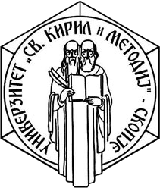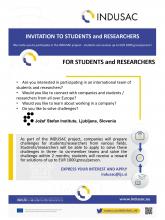Software Engineering (3+1+1)
Software Engineering (3+1+1)
- Offered by: Ss. Cyril and Methodius University - Skopje, Faculty of Computer Science and Engineering – FCSE
- Study programme: Software engineering
- Scientific-research field: Engineering and Technology
- Category: Information engineering
- Sub-category:Software engineering
- The master studies cycle consists of 60 ECTS.
- Study duration: 2 semesters
- One academic year is divided into two semesters with 30 weeks each (1 semester = 15 weeks)
- The first semester is comprised of courses only, while in the second semester there are fewer courses and the rest of the time is devoted to the final project, i.e. master thesis.
- Enrollment requisites: fully completed undergraduate study cycle with a minimum of 240 ECTS with a degree in the fields of computer science and/or computer engineering. In the case of having an appropriate degree with less than 240 ECTS, the student has to enroll the introductory courses first.
- Introductory courses: only for students that have obtained less than 240 ECTS. A number of differential introductory courses are offered in order to level up the required competences. Upon successful completion of the introductory courses, the student has the right to continue with the formal master study programme courses in the second year of studies.
- First semester: 3 compulsory courses + 2 elective courses (one of the elective courses can be chosen from the courses list offered by the University)
- Second semester: 1 compulsory course + 1 elective course (can be chosen from the courses list offered by the University only if this opportunity has not been used in the previous semester) + final master thesis project that equals 18 ECTS.
- 1 ECTS = 30 hours of work load.
- Contact hours per week is 4.
|
Course |
Semester |
ECTS |
Prerequisite |
|
| 1 |
Probability and statistics |
VII |
6 | - |
| 2 | Web design | VII | 6 | - |
| 3 |
Elective course 1 |
VII |
6 |
- |
| 4 |
Elective course 2 |
VII |
6 |
- |
| 5 |
Elective course 3 |
VII |
6 |
- |
| 6 | Information systems | VIII | 6 | - |
| 7 | Elective course 4 | VIII | 6 | - |
| 8 | Elective course 5 | VIII | 6 | - |
| 9 | Elective course 6 | VIII | 6 | - |
| 10 | Elective course from University list of available courses | VIII | 6 | - |
|
Course |
Semester |
ECTS |
Prerequisite |
|
| 1 |
Distributed computer systems |
VII |
6 | Computer networks and Databases |
| 2 | Artificial intelligence | VII | 6 | - |
| 3 |
Computer graphics |
VII |
6 |
- |
| 4 |
Network programming |
VII |
6 |
- |
| 5 |
Web-based systems |
VII |
6 |
Network programming |
| 6 | Software project management | VII | 6 | - |
| 7 | Advanced processor architectures | VII | 6 | - |
| 8 | Embedded computer systems | VII | 6 | Computer architectures |
| 9 | Network software | VII | 6 | - |
| 10 | Programming project | VII | 6 | - |
| 11 | Visualization | VII | 6 | - |
| 12 | Image processing | VIII | 6 | - |
| 13 | E-commerce and M-commerce | VIII | 6 | - |
| 14 | Public mobile networks | VIII | 6 | Network programming |
| 15 | Geographic information systems | VIII | 6 | - |
| 16 | Virtual reality | VIII | 6 | - |
| 17 | Computer animation | VIII | 6 | - |
| 18 | Computer security and protection | VIII | 6 | - |
| 19 | Multimedia systems | VIII | 6 | Distributed computer systems |
| 20 | Biocybernetics | VIII | 6 | Artificial intelligence |




